Social Justice
The Preferential Option for the Poor (Social Justice)
-Recalling that almost half of the world’s population lives on less than a dollar a day…
-W.H.O. Maps showing healthcare disparities worldwide
-My short documentary video on statistics/reality of life in Uganda
–St. Damien’s Hospital: The only free pediatric hospital in Haiti
–Catholic Relief Services: Programs (including Operation Rice Bowl)
–Boston Healthcare for the Homeless
-Some photos:
. . . . . . . . . . . . . . . . . . . .
Christian/Catholic Teaching on the Preferential Option for the Poor:
“For I was hungry and you gave me something to eat, I was thirsty and you gave me something to drink, I was a stranger and you invited me in, I needed clothes and you clothed me, I was sick and you looked after me, I was in prison and you came to visit me.” -Matthew 25:35-6.
“The bread that you store up belongs to the hungry; the coat that lies in your chest belongs to the naked; the gold that you have hidden in the ground belongs to the poor.” -St. Basil the Great (4th c.)
“Life’s most persistent and urgent question is: What are you doing for others?'” -Rev. Dr. Martin Luther King, Jr.
“…how can one avoid being depressed when he sees with his own eyes millions of people going to bed hungry at night? How can one avoid being depressed when he sees with his own eyes millions of people sleeping on the sidewalks at night, no beds to sleep in, no houses to go in. How can one avoid being depressed when he discovers that out of India’s population, more than 400,000,000 people, some 380,000,000 earn less than ninety dollars a year. Most of these people have never seen a doctor or dentist. As I notice these conditions, something within me cried out, “Can we in America stand idly by and not be concerned?”… All I’m saying is simply this, that all life is interrelated, that somehow we’re caught in an inescapable network of mutuality tied in a single garment of destiny. Whatever affects one directly affects all indirectly.”-Martin Luther King, Jr. (see his entire 1963 speech at WMU)
“Pray with me: Make us worthy, Lord, to serve our fellow men throughout the world who live and die in poverty and hunger.” -Mother Teresa of Calcutta
“… love for widows and orphans, prisoners, and the sick and needy of every kind, is as essential to [the Church] as the ministry of the sacraments and preaching of the Gospel. The Church cannot neglect the service of charity any more than she can neglect the Sacraments and the Word” (no. 22). God is Love (Deus Caritas Est), Pope Benedict XVI, 2005
“A basic moral test is how our most vulnerable members are faring. In a society marred by deepening divisions between rich and poor, our tradition recalls the story of the Last Judgment (Mt 25:31-46) and instructs us to put the needs of the poor and vulnerable first.” “Seven Themes of Catholic Social Teaching”, U.S. Catholic Bishops, 2005
“While the common good embraces all, those who are weak, vulnerable, and most in need deserve preferential concern. A basic moral test for our society is how we treat the most vulnerable in our midst” (no. 50). Forming Consciences for Faithful Citizenship, U.S. Catholic Bishops, 2007
“Jesus takes the side of those most in need. As followers of Christ, we are challenged to make a fundamental ‘option for the poor’–to speak for the voiceless, to defend the defenseless, to assess life styles, policies, and social institutions in terms of their impact on the poor. ” (no. 16).
“…poverty is not merely the lack of adequate financial resources. It entails a more profound kind of deprivation, a denial of full participation in the economic, social, and political life of society and an inability to influence decisions that affect one’s life…. Therefore we should seek solutions that enable the poor to help themselves through such means as employment” (no. 188).
“The first line of attack against poverty must be to build and sustain a healthy economy that provides employment opportunities at just wages for all adults who are able to work. Poverty is intimately linked to the issue of employment…. Expanded employment especially in the private sector would promote human dignity, increase social solidarity, and promote selfreliance of the poor” (no. 196). –Economic Justice for All, U.S. Catholic Bishops, 1986
“…the universal destination of goods requires that the poor, the marginalized and in all cases those whose living conditions interfere with their proper growth should be the focus of particular concern. To this end, the preferential option for the poor should be reaffirmed in all its force…. It affects the life of each Christian inasmuch as he or she seeks to imitate the life of Christ, but it applies equally to our social responsibilities and hence to our manner of living…” (no. 182). The Compendium of the Social Doctrine of the Church, Pontifical Council for Justice and Peace, 2005
. . . . . . . . . . . . . . .
Photos copyright 2012 Tommy Heyne
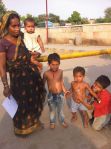
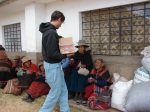




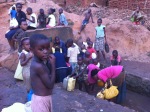


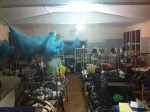
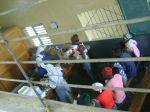

You must be logged in to post a comment.